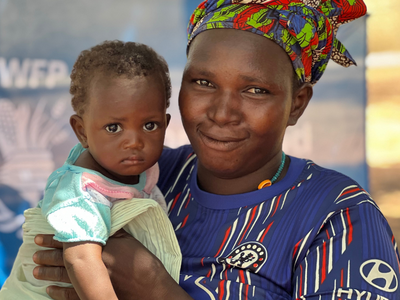Mali
- 1.6 million
- people face acute food insecurity
- 414,500
- people are internally displaced, while Mali also hosts 276,000+ refugees
- 1.6 million
- children under 5 at risk of acute malnutrition
Mali, a vast landlocked country in the heart of the Sahel, ranks 188 out of 193 in UNDP’s 2023 Human Development Index. The country faces major challenges in achieving Sustainable Development Goal 2 (Zero Hunger) and improving nutrition.
Armed conflict, insecurity and climate shocks such as floods and droughts have contributed to a progressive deterioration of livelihoods in the country. Agriculture, employing 80 percent of the population, is undermined by land degradation, lack of fertilizers, post-harvest losses and limited market access, leaving smallholder farmers highly vulnerable.
Northern and central regions are experiencing severe hunger, driven by conflict, rising food prices, energy shortages and the climate crisis. The November 2025 Cadre Harmonisé projected 1.6 million people acutely food insecure during the lean season, including 1.5 million in IPC Phase 3, a 9 percent increase from the previous year. The 2025 nutrition survey reported a Global Acute Malnutrition rate of 8.7 percent, with several regions surpassing the WHO emergency threshold.
As of December 2025, Mali hosted 414,500 internally displaced people and 270,000 refugees, further straining already fragile resilience. The combination of insecurity, climate shocks and economic pressures has disrupted food systems, while funding constraints have compounded the situation.
The World Food Programme works in partnership with the Government, UN agencies and civil society organizations to provide an integrated assistance package of emergency life-saving aid and long-term resilience activities, in northern and central regions.
What the World Food Programme is doing in Mali
-
Crisis response
-
WFP reaches shock and crisis-affected populations with food or cash emergency assistance to save lives and protect livelihoods. WFP responds to large-scale crises, mainly linked to climate and conflict, but also to seasonal shocks.
-
School feeding
-
Nutrition
-
Resilience
-
Capacity strengthening
-
Logistics
Mali news releases
Go to pagePartners and donors
Find out more about the state of food security in Mali
Visit the food security analysis pageContacts
Office
Badalabougou Est, Rue 31, Porte 26 – BP120 – Bamako – Mali
Bamako
Mali





